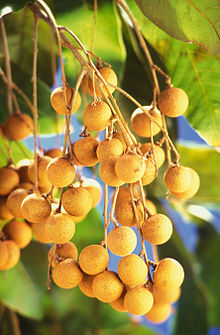Lungan – Longan
Dimocarpus longan, commonly known as the longan (/ˈlɒŋɡən/) and dragon's eye, is a tropical tree species that produces edible fruit. It is one of the better-known tropical members of the soapberry family Sapindaceae, to which the lychee and rambutan also belong. The fruit of the longan is similar to that of the lychee, but less aromatic in taste. It is native to tropical Asia and China.
| Longan | |
|---|---|

| |

| |
| Longan fruit | |
| Scientific classification | |
| Kingdom: | Plantae |
| Clade: | Tracheophytes |
| Clade: | Angiosperms |
| Clade: | Eudicots |
| Clade: | Rosids |
| Order: | Sapindales |
| Family: | Sapindaceae |
| Genus: | Dimocarpus |
| Species: | D. longan
|
| Binomial name | |
| Dimocarpus longan | |
| Synonyms | |
| |
| Longan | |||||||||||||||||||||||||||
|---|---|---|---|---|---|---|---|---|---|---|---|---|---|---|---|---|---|---|---|---|---|---|---|---|---|---|---|
 "Longan" in Traditional (top) and Simplified (bottom) Chinese characters | |||||||||||||||||||||||||||
| Traditional Chinese | 龍眼 | ||||||||||||||||||||||||||
| Simplified Chinese | 龙眼 | ||||||||||||||||||||||||||
| Literal meaning | 'dragon eye' | ||||||||||||||||||||||||||
| |||||||||||||||||||||||||||
The longan (from Cantonese lùhng-ngáahn 龍眼, literally 'dragon eye'), is so named because it resembles an eyeball when its fruit is shelled (the black seed shows through the translucent flesh like a pupil and iris). The seed is small, round and hard, and of an enamel-like, lacquered black. The fully ripened, freshly harvested fruit has a bark-like shell, thin, and firm, making the fruit easy to peel by squeezing the pulp out as if one were "cracking" a sunflower seed. When the shell has more moisture content and is more tender, the fruit becomes less convenient to shell. The tenderness of the shell varies due to either premature harvest, variety, weather conditions or storage conditions.

